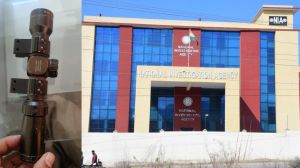In Bhagwat’s Kerala speech, echo of RSS’ fading ‘aversion’ to English
Once identified with its ‘Hindi, Hindu, Hindustan’ slogan, the Sangh is increasingly embracing English to widen its reach and break into Indian intellectual discourse
 Senior Sangh leaders such as RSS general secretary Dattatreya Hosabale, who holds an MA degree in the English literature, frequently speaks English in private conversations and even public gatherings. Express Photo by Manoj Dhaka
Senior Sangh leaders such as RSS general secretary Dattatreya Hosabale, who holds an MA degree in the English literature, frequently speaks English in private conversations and even public gatherings. Express Photo by Manoj Dhaka “Sajjan aur mata, bhagini (Gentlemen, mothers and sisters), I have been asked to speak in English, which is not the language of my practice, nor my study. It is a beautiful language, but I feel it is inadequate in expressing Bharatiya concepts. Still, I will try and (so), please bear with me.”
On October 7, addressing a gathering at Kochi in Kerala, these were the words with which Rashtriya Swayamsevak Sangh (RSS) chief Mohan Bhagwat began his speech, and then spoke extempore for the next 50 minutes in fluent English.
The event captured the RSS’s reservation about the English language and, at the same time, its willingness to engage with it. Once identified by its critics with the slogan “Hindi, Hindu, Hindustan”, the Sangh is now seen to be increasingly embracing the language, not only to widen its reach but also to enter the Indian intellectual discourse dominated by English.
Senior Sangh leaders such as RSS general secretary Dattatreya Hosabale, who holds an MA degree in the English literature, frequently speaks English in private conversations and even public gatherings. While the Sangh has traditionally published its literature in both Hindi and English, its frequency of publishing English books has increased over the years, say Sangh sources. What is more, many Sangh schools, known as Saraswati Shishu Mandir and run by its affiliate Vidya Bharati, have even switched to the English medium in the past half a decade.
Sources said these include schools in the Hindi heartland states including Uttar Pradesh. However, a senior RSS leader said this was not being done as a policy sanctioned from top.
“These decisions are taken by the respective school principals based on demands from parents. Also, there are certain requirements of the CBSE curriculum for schools that follow it. The idea is to give Bharatiya values,” he said.
According to an RSS source, this is in rather stark contrast to the stand that the Sangh took in the 1970s, when it was opening its schools in the Northeast to counter the influence of Christian missionaries. Then under KS Sudarshan, the Sangh had rejected an offer of land and other resources from the Arunachal Pradesh government because it was conditional on English education.
RSS sources conceded that Bhagwat delivering his speech in English was a rare occurrence. “While he does make private conversations in English with people who do not know native languages, he makes it a point to speak in Hindi or Marathi publicly. Even in Tamil Nadu, he has addressed gatherings in Hindi with real-time translation by local workers,” a senior RSS leader said.
Notably, pushing for Hindi in an interview in 1973, then RSS chief MS Golwalkar had narrated how he was requested in Tamil Nadu to address a gathering in English but he spoke in Hindi with a Tamil translation. “One day I spoke in English and the next day in Hindi. Afterwards, on enquiring from the trainees, I found that more persons could understand Hindi than English. It is quite natural, because so many words are common,” he had said.
BJP MP Rakesh Sinha, who is associated with the Sangh and has authored books on the organisation, argues that the RSS is actually free of language parochialism and that its openness to English is merely a nod to current realities.
“Language is an expression of culture. So, the RSS emphasis is on promotion of Indian languages. For the last 400 years, English remained lingua franca and became the language of global discourse. In every field, be it literature or otherwise, the elites were all articulating in English. The RSS tried erecting a parallel linguistic elite. But it also understands the reality of the society. It is true that a big section of India speaks and understands English. So, the ideology must reach them too,” he said.
J Nandakumar, national convenor of the RSS’s think tank Prajna Pravah, however, says that the Sangh was never opposed to English.
“The RSS has only been opposed to its colonising influence over our culture. Few people know that between 1925 and 1940 all Sangh shakha commands were in English. They were replaced with Sanskrit 1941 onwards. (Golwalkar’s) book ‘A Bunch of Thoughts’ was first published in English. When he travelled to Kerala at that time, he often spoke in English,” Nandakumar said.
Agreeing with Nandakumar, Sinha said, “Almost 90% of (former RSS leader and Bharatiya Jan Sangh MP) Dattopant Thengadi’s speeches in Parliament were in English.”
Nandakumar said the Sangh was not averse to engaging with English to reach those who do not understand native languages. “We will keep our values but we will not neglect English, we will learn it, just as we will learn French if needed,” he said.
- 01
- 02
- 03
- 04
- 05































